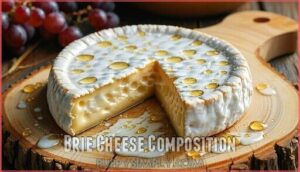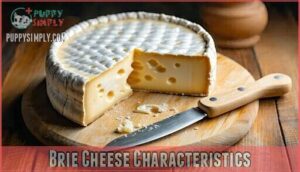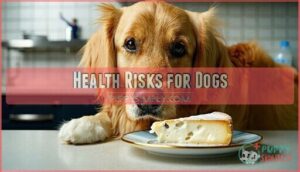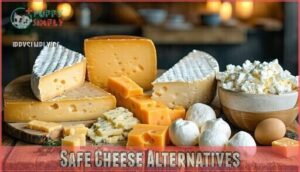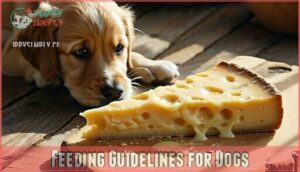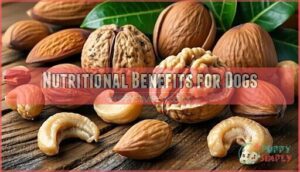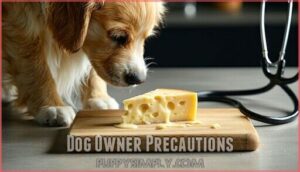This site is supported by our readers. We may earn a commission, at no cost to you, if you purchase through links.
 While dogs can technically eat brie cheese in tiny amounts, it’s not recommended for your furry friend.
While dogs can technically eat brie cheese in tiny amounts, it’s not recommended for your furry friend.
This creamy French cheese packs too much fat and can trigger stomach upset or even pancreatitis in sensitive pups.
Many dogs also struggle with lactose, making dairy a risky choice.
If your dog snatches a small bite, don’t panic – they’ll likely be fine.
However, that rich, buttery texture we love spells trouble for canine tummies.
The high fat content hits dogs harder than humans, potentially causing diarrhea, vomiting, or worse.
Smart alternatives and proper portions make all the difference for keeping your pup healthy and happy.
Table Of Contents
Key Takeaways
- Your dog can technically eat brie cheese in tiny amounts, but it’s not recommended due to its high fat content (60-75% butterfat) that can trigger pancreatitis and digestive upset.
- You’ll want to avoid giving brie regularly since most dogs are lactose intolerant and can’t properly digest dairy products, leading to diarrhea, vomiting, and stomach discomfort.
- If you’re looking for safer cheese alternatives, stick with low-fat options like cottage cheese or mozzarella in small portions rather than rich, creamy cheeses like brie.
- You should monitor your dog closely for 24 hours after they eat any brie, watching for symptoms like vomiting, diarrhea, or lethargy, and contact your vet if serious issues develop.
What is Brie Cheese
You’ll recognize brie as that creamy, soft cheese with the white fuzzy rind that comes from France and contains about 60-75% butterfat from cow’s milk.
This rich cheese gets its distinctive buttery flavor with hints of mushrooms and nuts from the edible white mold called Penicillium candidum that forms its characteristic rind.
Brie Cheese Composition
Understanding brie cheese composition helps you make informed decisions about your dog’s treats.
This soft French cheese contains 60-75% milk fat percentage, making it a double cream variety.
The white rind composition includes edible Penicillium candidum mold that’s safe for both humans and dogs.
Brie’s nutrient breakdown reveals high protein, calcium, and saturated fats through traditional production process methods.
Brie Cheese Characteristics
Brie cheese stands out with its distinctive creamy interior and edible white rind.
This French delicacy’s unique characteristics make it tempting to share, but understanding what makes brie special helps you decide if brie cheese is safe for your furry friend.
Key brie cheese characteristics include:
- Brie Texture: Soft, creamy center that becomes runnier as it ripens
- Rind Composition: White Penicillium candidum mold that’s completely edible
- Flavor Profile: Buttery taste with earthy, mushroom-like undertones
- Production Methods: Traditional aging process in small wheel shapes
- Milk Source: Made exclusively from cow’s milk with high butterfat content
Nutritional Value of Brie Cheese
One wheel of brie cheese packs impressive nutritional benefits, including high calcium levels for bone health and vitamin A for immune support.
Brie’s macronutrients feature 60-75% butterfat content, while its mineral profile includes phosphorus and B-complex vitamins.
However, this caloric density means just small portions deliver significant nutrients, though nutrient bioavailability varies between individual dogs.
Some cheeses also provide essential fatty acids that are beneficial.
Can Dogs Eat Brie
Your furry friend can technically eat brie cheese, but it’s not the healthiest choice for their diet.
While your pup can nibble brie cheese, it’s definitely not their healthiest snack option.
While brie isn’t toxic to dogs, it comes with several important factors to take into account that responsible pet owners should understand.
Here are the key factors to keep in mind:
- Brie safety depends on your dog’s size, age, and individual tolerance to dairy products
- Rind concerns require you to remove the white moldy exterior before offering any to your pup
- Portion control is absolutely critical – think tiny nibbles, not generous chunks
Breed sensitivity varies considerably, with some dogs handling dairy better than others. Vet consultation becomes essential if you’re unsure about introducing brie cheese dogs can safely consume.
The question "is brie safe" doesn’t have a simple yes or no answer – it’s more about moderation and monitoring your dog’s reaction to this rich, creamy treat.
Goat cheese, a potentially safer alternative, can provide essential fatty acids beneficial for a dog’s coat and immune health.
Health Risks for Dogs
While brie cheese won’t poison your dog, it can cause serious health problems that you’ll want to avoid.
The high fat content and lactose can trigger digestive upset, weight gain, and even dangerous conditions like pancreatitis in your furry friend.
High Fat Content Risks
That rich, creamy brie cheese packs a dangerous punch with its 50-60% fat content.
This saturated fat overload can trigger pancreatitis in your dog, causing severe abdominal pain and potential hospitalization.
High-fat foods like brie also lead to rapid weight gain and obesity concerns, creating a dietary imbalance that strains your pet’s entire system.
Lactose Intolerance in Dogs
Most dogs can’t properly digest dairy products due to lactase deficiency, making brie particularly problematic.
Most dogs lack the enzymes needed to digest dairy, making that creamy brie cheese a recipe for tummy trouble.
Your dog’s digestive system lacks the enzyme needed to break down lactose, leading to uncomfortable symptoms.
Here are three key signs of canine lactose intolerance:
- Digestive symptoms – diarrhea, vomiting, and gas
- Breed predisposition – smaller breeds show stronger reactions
- Dietary management – requires avoiding all dairy products
Potential Health Issues
Several serious complications can arise when dogs eat brie cheese regularly.
Weight gain becomes inevitable due to brie’s high calorie density, while sodium concerns may disrupt your dog’s electrolyte balance.
Lactose problems trigger gastrointestinal distress in sensitive pups.
Allergic reactions can develop over time, and this high-fat food substantially increases pancreatitis risk in susceptible dogs, leading to serious health issues due to its high calorie density.
Risk of Pancreatitis
Something as innocent as sharing brie cheese can trigger pancreatitis in your dog.
This condition occurs when fatty foods cause dangerous enzyme release, leading to severe abdominal pain and inflammation.
Certain breeds show higher predisposition to this serious health risk, and the saturated fat in brie makes it particularly problematic, requiring careful dietary management to prevent this painful, potentially life-threatening condition.
Safe Cheese Alternatives
If you’re looking for safer cheese options for your dog, you’ll want to choose low-fat varieties that won’t upset their stomach or pack on the pounds.
Cottage cheese, mozzarella, and plain cheddar offer better alternatives to brie, giving your pup a tasty treat without the high-fat risks that come with rich, creamy cheeses.
Low Fat Cheese Options
When brie’s too rich, lowfat cheese options become your best friend.
Cottage cheese tops the list with minimal sodium content and safe portions for most dogs. Mozzarella and reduced-fat cheeses offer dogfriendly alternatives without excessive calories.
Always check ingredient awareness—avoid garlic or onion additives. These dog cheese varieties provide safer treats, though homemade alternatives might be your safest bet for cheese-loving pups.
Exploring dog cheese alternatives can also provide suitable options.
Healthy Treat Alternatives
Skip the cheese drama and reach for better options instead.
Homemade dog treats using safe ingredients work wonderfully, while commercial dog treats offer convenience.
Fruit and veggies like carrots or apple slices make excellent healthy treats.
Protein-rich options such as plain chicken bits serve as perfect dog training rewards.
These dog-friendly snacks beat brie every time.
Consider options like Zuke’s Mini Naturals for store-bought convenience, which can be a perfect dog training reward.
Dog Friendly Cheese Types
When choosing dog-friendly cheese options, stick with low-fat varieties that won’t upset your pup’s stomach.
Hard cheeses contain less lactose than soft options like brie cheese, making them easier to digest.
You can find dog-friendly cheese products at many retailers.
- Cottage cheese – Low-sodium cheeses with probiotic benefits for digestive health
- Mozzarella – Mild flavor with reduced fat content in small cheese portions
- Cheddar – Aged hard cheeses with minimal lactose and safe ingredients
- Swiss – Another excellent safe cheese dogs can enjoy occasionally
Feeding Guidelines for Dogs
If you’re thinking about sharing your brie with your furry friend, you’ll need to follow some important safety rules to keep them healthy.
The key is giving tiny amounts only as a special treat, while watching carefully for any signs your dog can’t handle this rich cheese.
Moderation is Key
When offering brie cheese to your dog, portion control makes all the difference.
Think of it as an occasional indulgence rather than a regular snack.
Limited quantities prevent digestive upset and weight gain.
Responsible feeding means treating cheese serving size like you’d any high-value dog treat cheese – sparingly.
Treat frequency should remain minimal for ideal health.
Removing The Rind
Many pet parents wonder whether that white mold coating needs to go before sharing brie cheese with their furry friend.
While the edible rind contains Penicillium camemberti, it’s tougher to digest than the creamy interior.
- Rind texture makes it harder for dogs to break down properly
- Rind bacteria can potentially upset sensitive stomachs
- Rind allergens may trigger reactions in some pups
Some dogs may need specialized food due to underlying digestive issues.
Monitoring for Symptoms
After feeding your dog brie cheese, watch closely for digestive distress within 24 hours.
Monitor for symptoms like stool changes, vomiting, or diarrhea. Look for allergic reactions such as itching or swelling.
Notice appetite changes or lethargy signs that seem unusual. Digestive issues from brie cheese typically appear quickly, so keep your furry friend under observation.
Consulting a Veterinarian
Your veterinarian provides personalized advice based on your dog’s breed predisposition and health history.
Professional vet consultation becomes essential when introducing dietary changes or evaluating symptom severity after brie consumption.
Here’s when to seek veterinarian advice:
- Emergency situations – persistent vomiting or severe diarrhea
- Breed predisposition – breeds prone to pancreatitis need extra caution
- Symptom severity – worsening digestive issues require immediate attention
- Pet health concerns – existing conditions affect cheese tolerance
- Dog health risks – professional guidance prevents serious complications
Nutritional Benefits for Dogs
While brie cheese does contain some calcium and protein that your dog’s body can use, it doesn’t provide any essential nutrients that aren’t already found in quality dog food.
You’re better off thinking of brie as an occasional treat rather than a nutritional powerhouse for your pup.
Calcium and Protein Content
Brie cheese does pack calcium benefits and protein sources that support bone health and muscle development in dogs.
However, don’t let these nutritional benefits fool you into thinking it’s a health food for your pup.
The high fat content overshadows any growth support advantages.
Your dog gets better calcium and protein from their regular kibble without the digestive risks.
Essential Fatty Acids
Cottage cheese stands out among cheese benefits dogs can actually enjoy, offering better essential fatty acids than brie.
While dogs eat brie occasionally, it lacks meaningful omega-3 sources for ideal health.
- Skin Health: Essential fatty acids support healthy skin barrier function and reduce inflammation
- Coat Quality: Omega-3s promote shiny, soft fur and prevent dryness or flakiness
- Joint Support: Anti-inflammatory properties help maintain mobility and comfort in active dogs
- Brain Function: Fatty acids support cognitive development and mental sharpness throughout life
- Better Sources: Dogfriendly cheese like cottage cheese provides more beneficial nutrients than brie
Limited Nutritional Value
While brie cheese contains some calcium and protein, it’s basically empty calories for your furry friend.
This rich treat can’t provide the balanced nutrients dogs need and creates nutrient deficiencies when it replaces proper dog food.
Brie’s a poor substitute for quality dog treats designed specifically for canine health. Your pup deserves better nutrition than missed nutrients from fancy cheese.
Dog Owner Precautions
You’ll need to watch your dog carefully when introducing brie cheese, as each pup reacts differently to dairy products.
Start with tiny amounts and keep an eye out for stomach upset, allergic reactions, or digestive issues that could signal your furry friend can’t handle this rich cheese.
Avoiding Overfeeding
Remember, portion control matters more than you might think when feeding dogs cheese.
Treat frequency should stay minimal – think special occasions, not daily snacks.
Calorie counting helps maintain your dog’s weight management goals.
A small cube of brie cheese contains significant calories that can disrupt your pet’s balanced diet.
Moderation prevents cheese for dogs from becoming a feeding problem rather than an occasional reward, which is crucial for weight management.
Watching for Allergic Reactions
Beyond portion control, you’ll need to watch for allergic reactions when introducing brie to your dog’s diet.
Food allergies can develop suddenly, and early detection makes all the difference for your pet’s health.
- Immediate symptoms: Watch for facial swelling, hives, or difficulty breathing within 30 minutes
- Digestive signs: Vomiting, diarrhea, or excessive drooling may indicate adverse reactions
- Skin reactions: Itching, redness, or rash around the mouth suggests breed sensitivity to dairy
Choosing Dog Friendly Snacks
Skip the brie cheese and focus on proven dog-friendly snacks instead. Commercial snack labels should list simple, recognizable ingredients without harmful additives.
Homemade dog treats using peanut butter, pumpkin, or sweet potato offer healthy snack swaps. For a nutritious option, consider peanut butter recipes made at home.
Safe cheeses like cottage cheese work for portion control tips, but specialized dog treats provide better balanced canine diet support.
Maintaining a Balanced Diet
Your furry friend’s health depends on balancing treats with proper nutrition. Brie cheese should never replace their regular meals or upset their carefully planned dog nutrition guide.
Focus on meeting your pup’s complete nutritional needs while keeping toxic foods dogs can’t handle far away.
Here’s how to maintain perfect dietary balance:
- Limit treats to 10% of daily calories – Your dog’s wagging tail shouldn’t cost them their health through poor calorie control
- Measure portion sizes carefully – Even safe cheeses can derail their nutritional needs when given too generously
- Prioritize dietary fiber from dog food – Their digestive system craves consistency more than fancy human snacks
- Monitor hydration balance daily – Fresh water matters more than any cheese treat for ideal dog health tips
- Stick to vet-approved dog dietary needs – Professional guidance beats guesswork every time for your beloved companion
Frequently Asked Questions (FAQs)
Can dogs eat brie cheese?
While your pup can technically nibble brie cheese, it’s not the wisest treat choice.
The high fat content and lactose can upset their tummy, so save it for special occasions in tiny amounts.
Can dogs eat brie rind?
Yes, dogs can eat brie rind safely.
The white mold coating is edible and non-toxic.
However, it’s harder to digest than the cheese itself, so remove it to prevent potential stomach upset.
How do I know if my dog ate Brie?
Look for symptoms like vomiting, diarrhea, excessive drooling, or stomach discomfort within 2-12 hours. Check for missing cheese packaging or crumbs. If you’re unsure, contact your veterinarian immediately for guidance.
Can dogs eat cheese?
Cheese sits like a double-edged sword in your dog’s world.
You can offer small amounts occasionally, but choose wisely—cottage cheese and mozzarella work best, while high-fat varieties risk digestive upset and weight gain.
Is blue cheese safe for dogs to eat?
Blue cheese isn’t safe for your dog.
It contains roquefortine C, a toxic compound that can cause vomiting, diarrhea, seizures, and even death.
Skip this moldy cheese entirely—your pup’s health isn’t worth the risk.
What does brie cheese taste like?
Imagine butter melting on your tongue with earthy mushroom whispers dancing alongside nutty undertones.
Brie’s creamy texture feels like silk, while its mild tanginess creates a sophisticated flavor that’s rich yet surprisingly gentle on your palate, with a sophisticated flavor.
What to do if your dog eats brie?
Don’t panic if your dog sneaks some brie.
Monitor them closely for upset stomach, diarrhea, or vomiting.
Offer plenty of fresh water and contact your vet if symptoms persist or worsen within 24 hours.
How much brie can a dog eat?
A golden retriever once gobbled three brie wedges at a dinner party.
You should limit your dog to tiny tastes—maybe a teaspoon for small dogs, tablespoon for large breeds, as an occasional treat only.
Can dogs eat the rind from brie?
Yes, dogs can safely eat brie’s white rind since it’s made from edible Penicillium mold.
However, you should remove it because it’s harder to digest and might cause stomach upset in sensitive pups.
Do dogs like brie?
Like kids drawn to candy, many dogs find brie’s creamy texture appealing.
However, your pup’s preference varies by individual taste.
Some dogs love cheese’s rich flavor, while others aren’t interested in dairy products at all, which can be influenced by their individual taste and the creamy texture.
Conclusion
Like a protective shield guards a treasure, your awareness protects your dog’s health regarding brie cheese.
While can dogs eat brie cheese remains a valid question, the answer leans toward caution.
Small amounts won’t poison your pup, but the high fat content and lactose make it risky.
Choose safer alternatives like plain cottage cheese or dog-specific treats instead.
Your furry friend’s digestive system will thank you for making smarter snack choices that prioritize their long-term wellness.

